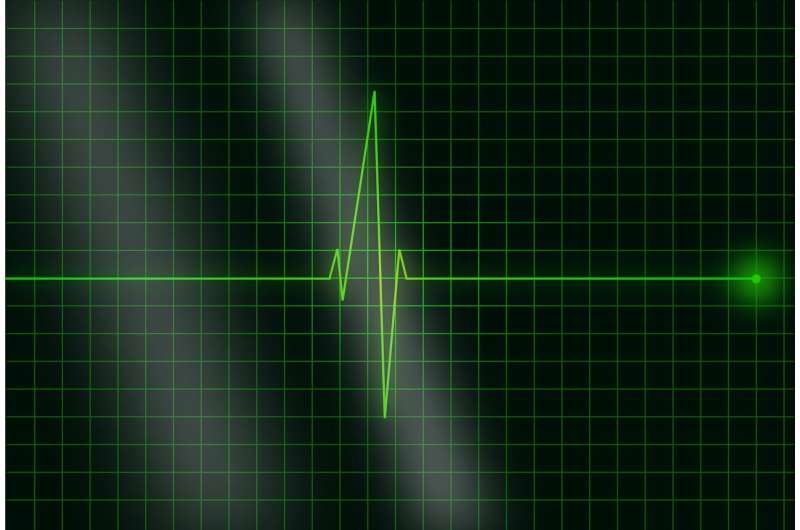This article has been reviewed according to Science X's editorial process and policies. Editors have highlighted the following attributes while ensuring the content's credibility:
fact-checked
trusted source
proofread
ADHD stimulants may increase risk of heart damage in young adults

Young adults who were prescribed stimulant medications for attention-deficit/hyperactivity disorder (ADHD) were significantly more likely to develop cardiomyopathy (weakened heart muscle) compared with those who were not prescribed stimulants, according to a study presented at the American College of Cardiology's Annual Scientific Session.
The study found that people prescribed stimulants such as Adderall and Ritalin were 17% more likely to have cardiomyopathy at one year and 57% more likely to have cardiomyopathy at eight years compared with those who were not taking these medications.
Cardiomyopathy involves structural changes in the heart muscle that weaken its pumping ability. It can cause a person to tire easily and limit their ability to perform daily tasks, and it often worsens over time.
However, researchers said that the overall risk of cardiomyopathy remained relatively low even when stimulants were used long-term. They said the findings do not necessarily point to a need for clinicians to change their approach to screening patients or prescribing stimulants.
"The longer you leave patients on these medications, the more likely they are to develop cardiomyopathy, but the risk of that is very low," said Pauline Gerard, a second-year medical student at the University of Colorado School of Medicine in Aurora, Colorado, and the study's lead author.
"I don't think this is a reason to stop prescribing these medications. There's very little increased risk of these medications over the long term; it's a real risk, but it's small."
ADHD is one of the most common neurodevelopmental disorders in children, affecting about one out of 10 American children aged 3 to 17 years, and can continue into adulthood. It is typically treated with behavioral therapy initially, which may be combined with stimulant or non-stimulant medications to help control behaviors that interfere with daily life and relationships. Stimulant medications can elevate blood pressure by causing the heart to beat faster and with greater force.
Most previous studies assessing the safety of stimulant medications have focused on the first year or two of use and found no evidence of harm to the heart. Since many patients are prescribed these medications in early childhood and continue taking them into adulthood, this new study was designed to assess their potential to cause harm over a longer period of time, Gerard said.
Using the TriNetX research database that includes information from about 80 hospitals across the U.S., researchers analyzed data from people diagnosed with ADHD between 20–40 years of age. Individuals with the presence or absence of a prescription for stimulant medications along with rates of cardiomyopathy that could potentially be linked to stimulant use were included. Those with heart damage caused by other known factors, such as cancer treatments, were excluded.
For the analysis, the researchers paired each person who had been prescribed stimulants with an individual who had not been prescribed stimulants but was as similar as possible in all other respects, such as age, sex and other health conditions.
Overall, 12,759 pairs were created and were followed for at least 10 years. Of these pairs, people prescribed stimulants were found to be significantly more likely to develop cardiomyopathy throughout the 10-year follow-up period, with the gap growing larger each year except the last two, when it narrowed slightly.
Despite the significant gap, the overall prevalence of cardiomyopathy was still quite low in both groups. After being prescribed stimulants for 10 years, 0.72% (less than three-quarters of one percent) of patients developed cardiomyopathy, compared with 0.53% (a little over half of one percent) among those who were not prescribed stimulants.
To put the numbers into context, Gerard said, "You can have almost 2,000 patients on these medications for a year and you might only cause one of them to have a cardiomyopathy that they otherwise would not have had, but if you leave them on it for 10 years, one in 500 will have that happen."
At these levels, researchers said the study does not suggest that aggressive testing for cardiovascular risk is warranted before prescribing stimulants, given that the potential benefits of testing must be balanced against the risks and costs. They suggest that further studies could help to identify subgroups of patients at greater risk who may benefit from future screening approaches.
Gerard said that it could also be helpful to study potential differences among different types of ADHD medications and different types of cardiomyopathies.
More information: Gerard presents the study, "ADHD Stimulant Use Associated with Increased Risk of Cardiomyopathy in Young Adults," on Sunday, April 7.



















